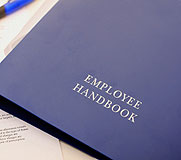Practice Areas > Employee Handbooks
Free Case Evaluation
Fill out the form below for a FREE evaluation of your case.Employee Handbooks In Florida
What should be included in my employee handbook or manual? Included in your employee handbook should be a non-discrimination/
harassment policy. That policy should outline a complaint filing process to report any
incidences of discrimination or harassment. Should you have such a process in place
and an employee fails to take advantage of the preventative and corrective
opportunities, you may avoid liability in a harassment suit.
Included in your employee handbook should be a non-discrimination/
harassment policy. That policy should outline a complaint filing process to report any
incidences of discrimination or harassment. Should you have such a process in place
and an employee fails to take advantage of the preventative and corrective
opportunities, you may avoid liability in a harassment suit.
With respect to minimum wage claims and employees who record their work
time, the handbook should also explain that employees should clock out once they
have completed their shift and have finished their work. Employees should be
warned that no work of any kind should be performed by employees before they
have clocked in or after they have clocked out. Employees should also be told to
punch out for all meal periods and should not perform any work while they are
punched out for any period. The handbook should also tell employees not to be on
the premises of your company when they are not scheduled to work. Most
importantly, employees should be told in the handbook that time records are the
basis for their payroll and there fore it is very important that time records be
accurate. Employees must report immediately any errors in the time records to their
supervisors so that any errors or possible errors can be investigated and corrections
made when needed.
As to benefits, this section of the handbook should be less detailed. The
handbook should not go into detail as to benefits, as each employee may not be
eligible for the same types of benefits. The handbook should merely refer employees
to the appropriate person (usually the Human Resources department) if they have
any questions about their benefits eligibility.
Finally, your employee handbook should list major infractions that may result
in discipline or termination. This will be helpful for unemployment compensation
claims where employees will allege that they did not know that their conduct
constituted a violation of company policy. Examples of infractions may include:
breach of client confidentiality; theft; unprofessional conduct (including threats of
violence or harassment); falsification of time records; working overtime without
authorization.
Each employee should receive a copy of the handbook and sign an
"Acknowledgement of Receipt," which should be on a separate page of the handbook
and able to be torn out and retained in each employee's personnel file.
This article is not intended to be an all-inclusive list of what your handbook
should contain. Your employee handbook is one of the most important documents
for your company, and therefore it is recommended to have an experienced labor and
employment attorney draft a handbook or at a minimum, review your current
handbook. New issues arise everyday in the employment context, and your handbook
should be updated to address these issues. For example, provisions had to be added
to employers' handbooks regarding employees' use of social media as well as new
provisions regarding the Nursing Mothers in the Workplace Act, which was recently
passed March 23, 2010. Our firm can also help employers draft other important
employment related documents, such as applications for employment, termination
forms, job descriptions, job advertisements, and performance evaluations.
Contact Us Today
Please fill out the form on the left for a free case evaluation. You may also call our office at 855-LABOR-FL (855-522-6735) to schedule a free phone consultation, or
contact us online. We're here to help you with your case or any questions you might have.
